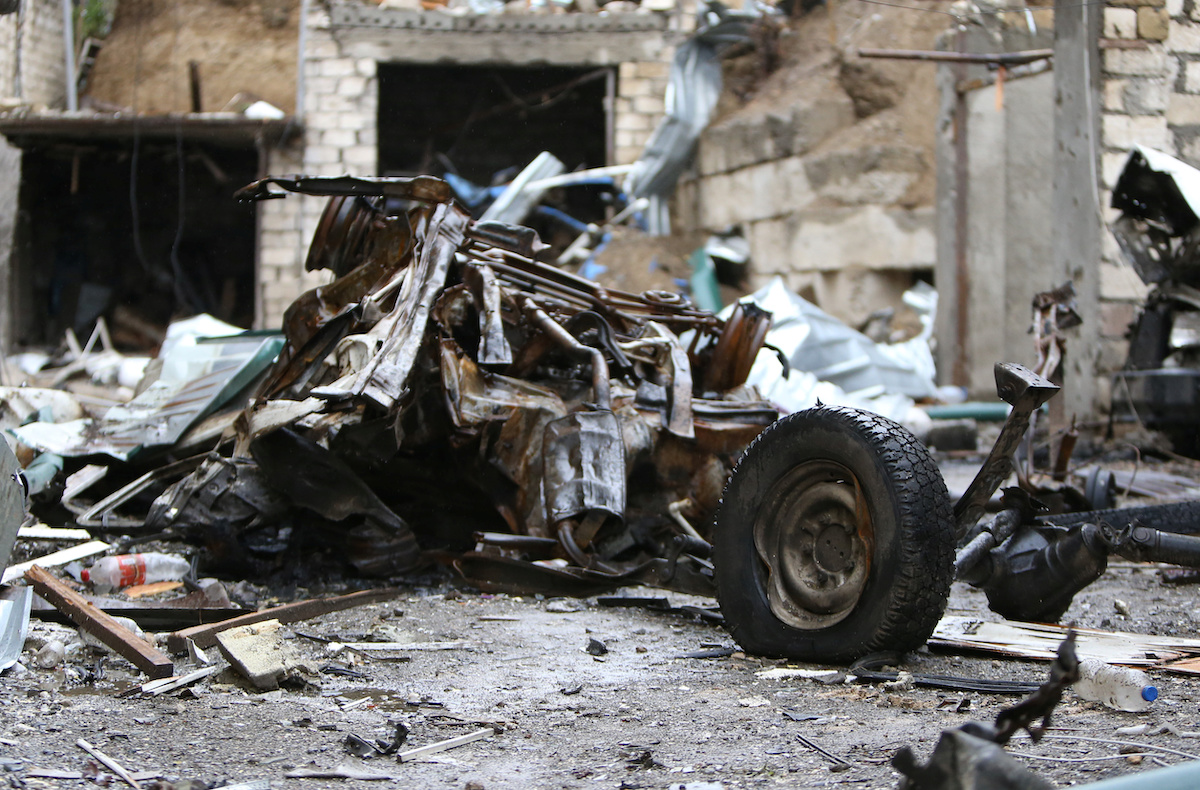Is it possible to cut the ‘Karabakh knot’ by force?
“No War!” Many Azerbaijanis and Armenians on social media have updated their profile pictures to include this frame. It’s a fashionable new trend. Of course, the sentiment is commendable. War is bad. War is the death of young people, it is pain, it is destitution. We all want world peace.
Not only in Armenia and Azerbaijan, but everywhere in the world, you can see signs and hear people asserting that “war is not a solution”, “there is no, and there cannot be a military solution to the conflict”.
This sounds convincing. Indeed, why fight if it is possible to resolve the conflict through negotiations? There are four UN Security Council resolutions, there are mediators in the form of the OSCE Minsk Group, and there are the Madrid principles, stating that:
• Armenian troops leave the occupied territories around Nagorno-Karabakh and these territories are returned under the control of Azerbaijan
• International peacekeeping forces are deployed along the front line
• Nagorno-Karabakh is granted temporary status
• A land corridor opens between Nagorno-Karabakh and Armenia
• Internally displaced persons return to their places of residence
• A final plebiscite is held in Nagorno-Karabakh to determine future status
• And all this is supported by international guarantees
But if all parties agree that war is bad and are ready to accept the Madrid principles in words, why is it still impossible to sign a peace treaty?
My subjective opinion: the Armenian side overestimated the “military results” of the first Karabakh war and its successes. Incidentally, first President of Armenia Levon Ter-Petrosyan agrees. In 1997, he wrote the article “War or Peace? It’s time to get serious”.
Among other things, the article stated: “We didn’t win the war, only the battle” and suggested considering possible compromises in order to consolidate success.
But this article cost him the presidency.
The very expression “military results” of the conflict or the expression “voting with bullets”, as Russian co-chairman Vladimir Kazimirov said, suggests the possibility of revising these “results” or a second round of “voting with bullets”, because Azerbaijan did not sign the act of surrender.
And it did not sign the armistice agreement, as there is no signature of Azerbaijan under the famous “Bishkek Protocol”. (At the time, there was an exchange of faxes with Moscow, but it was impossible to formalize a legally binding agreement).
If the peace agreement is not fair and mutually acceptable, it is not peace, but a truce for a more or less brief period. History is full of such cases. For instance, the first Balkan war, or even a more convincing example, the First World War.
The absolute majority in Azerbaijan considers the intermediate results of the first Karabakh war to be unfair, hence such enthusiasm and quite predictable national unity, even between irreconcilable political parties.
We saw a “dress rehearsal” of the attempt to change the unfair results of the first Karabakh war in 2016. Even then, Azerbaijan managed to break the myth of the invincibility of the “most powerful army in the South Caucasus”, though they endured heavy losses.
Unfortunately, this was not enough for the Armenian leadership to recognize the need to abandon the rhetoric of 1994. Moreover, the new Armenian authorities tried to completely change the format of the negotiations.
Prime Minister Pashinyan first said that Nagorno-Karabakh should become a separate party to the negotiations, and then said that “Artsakh is Armenia, period”. In Baku, this logic was neither understood nor appreciated.
Bloody battles continue along the front line in Karabakh. Both sides report artillery shelling of civilians. Azerbaijan reports a significant advance in the southern direction of the front and the capture of several strategically important positions in the north.
Apparently, the second Karabakh war is becoming more and more like a war of attrition. Neither side is ready to take the first step towards mutual compromises.
I would venture to express my vision of a possible way out of this crisis.
First of all, both sides must agree that a military solution is no solution at all. Or rather, it is a temporary solution, fraught with even greater consequences.
As an Azerbaijani author, I would like to hear this from the leadership of Armenia, so that they would stop using the rhetoric of “military results” and “voting with bullets” used in the first Karabakh war. Then there will be no temptation to change these results.
Secondly, gestures of goodwill from both sides are very much needed. The Armenian side could declare that it does not lay claim to the territory around the former Nagorno-Karabakh Autonomous Region and agree to negotiations on a phased withdrawal of troops from these territories.
And anyway, the Armenian population has never lived there, and these territories are absolutely deserted at the present time. Huge sums are spent to maintain them.
The Azerbaijani side could declare its readiness to conduct direct negotiations with the Karabakh Armenians and to restore the transport of cargo and energy through the region.
This is in Azerbaijan’s interests, because the Autonomous Republic of Nakhichevan is cut off from the mainland of Azerbaijan by three regions south of Nagorno-Karabakh and a strip of the territory of Armenia.
And most importantly, the leaders of Azerbaijan and Armenia could find the political will to make unpopular decisions. Any compromise will be perceived with hostility by the public.
Again, as an Azerbaijani author, it seems to me that Nikol Pashinyan’s situation is more complicated. He is under pressure from both the inside and the outside.
My prognosis is disappointing: the war of attrition will continue for a long time.



















